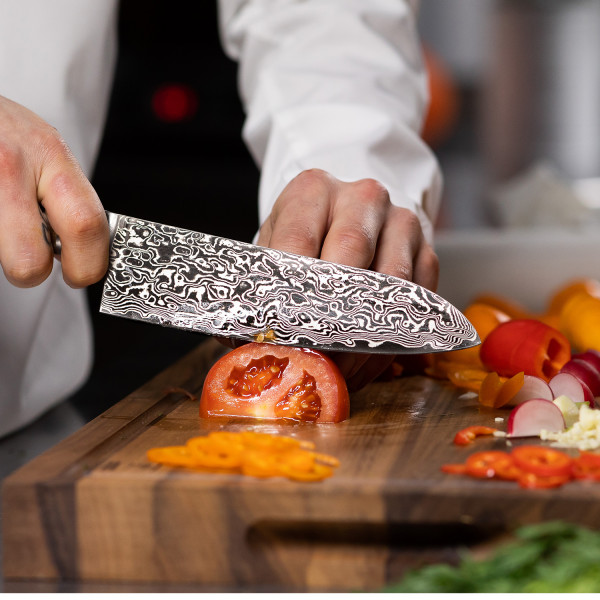Damastmesser sind die Königsklasse der Küchenmesser und erfreuen sich aufgrund ihrer außergewöhnlichen Schärfe und Schönheit immer größerer Beliebtheit.
Doch beim Kauf eines Damastmessers gibt es einige wichtige Faktoren zu beachten, um das perfekte Messer für Ihre Bedürfnisse zu finden. In diesem umfassenden Leitfaden werden wir Ihnen alles Wichtige über den Kauf von Damastmessern erklären, von den verschiedenen Messerarten bis hin zur Auswahl des richtigen Materials und der Pflege des Messers.
Die verschiedenen Messerarten:
Santokumesser: Das Allzweckmesser für die täglichen Schneidarbeiten in der Küche.
Chefmesser: Das vielseitige und universelle Kochmesser für präzises Schneiden, Würfeln und Hacken.
Schälmesser: Das kleine, handliche Messer zum Schälen und Trimmen von Obst und Gemüse.
Brotmesser: Das Messer mit gezackter Klinge für müheloses Schneiden von Brot und Gebäck.
Filetiermesser: Das flexible und schlanke Messer zum präzisen Filetieren von Fisch und Fleisch.
Steakmesser: Das scharfe Messer für den Genuss von saftigen Steaks.
Die Wahl des richtigen Materials:
Damaszenerstahl: Mehrschichtiger Stahl, der durch Falten und Schmieden eine einzigartige Musterung erhält.
VG-10 Stahl: Hochwertiger japanischer Stahl, der eine ausgezeichnete Härte und Schnitthaltigkeit bietet.
Härtegrad: Ein höherer Härtegrad bedeutet eine längere Schärfe, aber auch eine erhöhte Sprödigkeit des Messers.
Weitere wichtige Aspekte beim Damastmesser-Kauf:
Griffmaterial: Wählen Sie einen Griff, der gut in der Hand liegt und rutschfest ist, wie z.B. Pakkaholz oder Micarta.
Balance und Gewicht: Achten Sie auf eine ausgewogene Balance des Messers und ein angenehmes Gewicht für eine optimale Handhabung.
Pflege und Wartung: Erfahren Sie, wie Sie Ihr Damastmesser richtig reinigen, lagern und nachschärfen können, um seine Lebensdauer zu verlängern.
Tipps zum Damastmesser-Kauf:
Recherchieren Sie gründlich und lesen Sie Kundenbewertungen, um die Qualität und Leistung des Messers zu überprüfen.
Berücksichtigen Sie Ihr Budget und finden Sie das beste Preis-Leistungs-Verhältnis.
Achten Sie auf Garantien und Rückgabemöglichkeiten, falls Sie mit Ihrem Kauf nicht zufrieden sind.

